How fake news from Sudan’s regime backfired
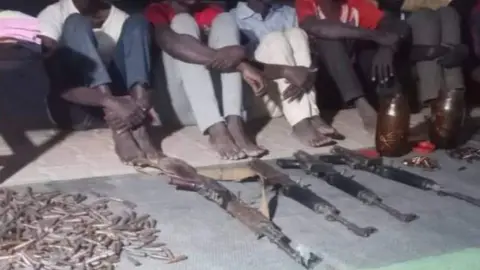 Facebook / NISS
Facebook / NISSThe BBC has uncovered evidence that Sudan's security services tried to undermine popular protests by rounding up students, torturing them until they admitted to violent intent, and spreading false confession videos on Facebook and state TV. But the plot backfired, and now the students can tell their story.
"You are dirty! You are slaves!"
Racist insults rained down on John and his friends as, he claims, the security services beat them with fists and sticks and stunned them with electric shocks.
BBC Arabic's investigations team has spoken to multiple sources who can attest to the torture that John and his fellow students from Darfur underwent, for hours at a time.
John believes they were being tested: which of them would confess to being part of a Darfuri rebel group and inciting violence in Sudan?
How the protests grew
Since mid-December, anti-government protests have rocked Sudan nearly every day. During the demonstrations, the government cracked down hard. Human rights groups say that well over 60 people have been killed. Many more have been injured and hundreds arrested.
The crackdown did not deter the protesters however. On 11 April President Omar al-Bashir was ousted in a military coup after 30 years in power.
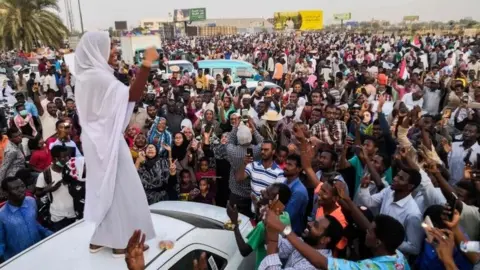 AFP/Getty Images
AFP/Getty ImagesJohn, whose name has been changed for this article because of concerns for his safety, hadn't taken part in the protests when they began in December. But that didn't stop him being swept up in a raid on a student house in Sennar, a town on the Blue Nile south-east of Khartoum.
Forced confessions
When the protests started escalating, the National Intelligence Security Service (NISS) created propaganda to pin the unrest on rebels from Darfur.
Darfur is a region in the west of Sudan which has been ravaged by conflict since 2003.
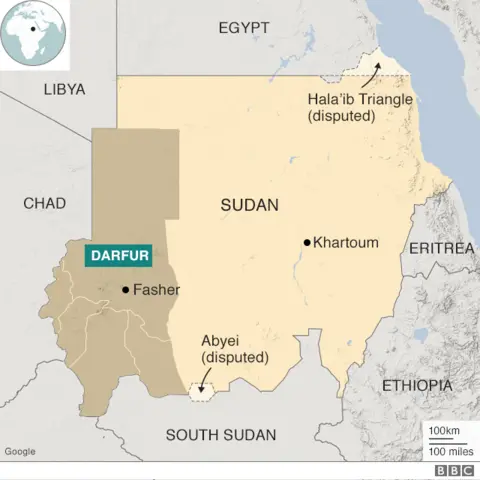
On 29 December of last year a press conference was held in Khartoum. A government information minister claimed to have exposed a "rebel cell" that was stoking the protests and planning violence. Sudanese state TV channels broadcast claims that the security services had apprehended members of this "cell", and the videos were also posted to government-run pages on Facebook.
- LISTEN: A podcast version of this story is available from BBC Trending on the BBC World Service
The videos showed young black men, looking meek and resigned, confessing that they were part of the Sudan Liberation Movement, a militant Darfuri group led by rebel leader Abdel Wahid el-Nour.
The students in the videos declared that they had attempted to incite violence and that they had carried weapons to protests.
But according to John, who knows three of the men who confessed in the videos, and several other sources BBC Arabic's investigations team spoke to, the confessions were completely made up - beaten out of the students with torture.
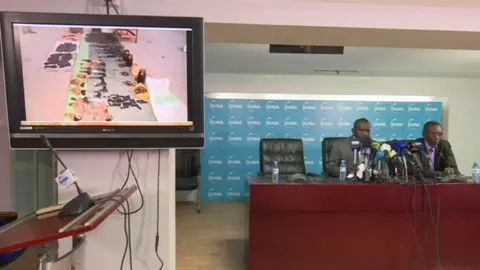 AFP
AFPWhat really happened
Nearly a week before the press conference, John was staying at a house rented by a group of Darfuri students in Sennar. Sennar University had been closed down due to the protests, and while some students went home, others sought a bed in the house after being sent away from the university.
John described what happened to him on the morning of 23 December. "There were 30 of us having our breakfast when three Toyota pickup trucks without number plates showed up. They arrested us and... took us to the NISS premises in Sennar state."
They were tortured, and later sent to an intelligence office near Khartoum's Shendi bus station.

You may also be interested in:

Kept apart, but arrested under remarkably similar circumstances, was another group of Darfuri students from Khartoum and Alzaiem Alazhari universities. The students were held captive in cramped conditions and also subjected to torture, according to multiple sources who spoke to the BBC. A detainee who was imprisoned alongside them recounted the torture methods in detail, and said that a PVC hose, made rigid with a stick, was used to make the beatings more painful.
One of the students from the University of Khartoum described to the BBC how their interrogators accused them of making petrol bombs, or Molotov cocktails. In fact, he claimed: "It was the first time I had ever seen a Molotov."
At one point, John claims that Salah Gosh, the Director General of NISS who resigned after the 11 April coup, came to the prison in person to ask if the students were being tortured. After he left, John says that those who said they hadn't been mistreated were left alone, but any who said they were being tortured were beaten again.
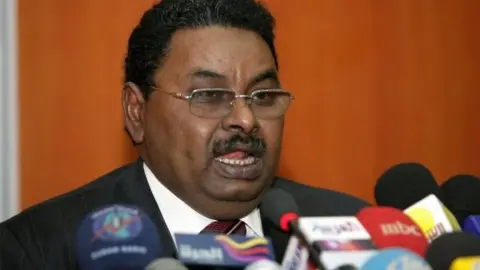 AFP/Getty
AFP/GettyJohn said "they observed which of us was most afraid of torture", and that the security services took a group of the younger students away. Afterwards, they told John that they had been electrocuted and water-boarded, then instructed to give a statement to a camera.
"I am part of the Abdel Wahid el-Nour movement. I marched in the Khartoum university protests. I was a student from the dorms going home, carrying a bag and knives."
If the security services hoped to discredit the protesters though, that strategy backfired.
How did the plot go wrong?
Friends of the young men in the videos identified them and dismissed the confessions both online and in interviews with the BBC. They attested that their friends were ordinary students, peaceful young men, and had no ties to any militant groups. In fact, some of them were in groups actively opposed to militia groups in Darfur.
Multiple interviewees, including a representative of Human Rights Watch (HRW), said that their ethnicity, as black Africans from Darfur, was being used against them to give the impression they were part of a violent movement.
Associate director of HRW's Africa division, Jehanne Henry said: "[There is] a lot of racism in the security forces in Sudan and amongst the security agents who are doing these arrests and detentions and subjecting the students to really serious beatings."
One friend of the students told the BBC: "Through the Facebook posts, we were able to expose the lying regime's false accusations, and the truth of what these youths have experienced since their arrests."
Facebook comments disputing the validity of the confessions went viral. The incident even helped fuel the protests, as activists in the streets directed new chants at President Bashir: "Hey you, arrogant racist! We are all Darfur!"
Social media posts bearing the hashtag #WeAreAllDarfur were shared thousands of times.
The incident has not been forgotten. After the 11 April coup, the victorious protestors have been filmed chanting and singing "Darfur is our home! Revolution! Revolution!"
Allow X content?
Former President Bashir is wanted by the International Criminal Court for alleged war crimes, genocide, and crimes against humanity committed in Darfur. The Transitional Military Council which has taken over Sudan is dominated by figures who are strongly implicated in the alleged war crimes.
Although there has been jubilation at the ousting of Mr Bashir, HRW's Jehanne Henry says that the protesters are acutely aware that members of the Transitional Military Council, as she put it, "have blood on their hands."
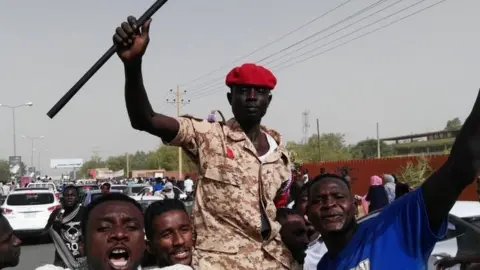 AFP
AFPWhat happened to John?
Despite being tortured, John never gave the authorities a false confession. He was released without being charged after three months in detention.
"When I was released, the officers came and asked for forgiveness. They told me: 'We were just doing what we were told to do.' I told them: 'I'm innocent, you came and raided my house, detained and tortured me for no reason. I don't forgive any of you.'"
All of the students in the confession videos were released without charge, indicating that the security services had little hard evidence against them. The Darfur Bar Association has called for the release of Darfuris who still remain in detention for political reasons.
Although John wasn't involved in the protests when he was arrested, he has since become an active participant, and the torture he was put through only made him more determined to oust the regime.
Omar al-Bashir and his security chief may have fallen, but his generals are still in control of the country, and protesters have vowed to continue sit-ins until they hand power over to a civilian government.
The Sudanese Embassy in London did not respond to a request for comment.
The false confession videos showed that the regime was trying to use social networks to further its own ends, but was outsmarted by ordinary Sudanese people on those platforms. Before he was ousted, Sudan's President Omar al-Bashir said: "The change of government is not through WhatsApp and Facebook, but through elections."
The coup proved him wrong.
Written by Flora Carmichael
With additional reporting by Owen Pinnell
Do you have a story for us? Email BBC Trending.
More from Trending: Eritrean Press: Reporting on Africa's most secretive state
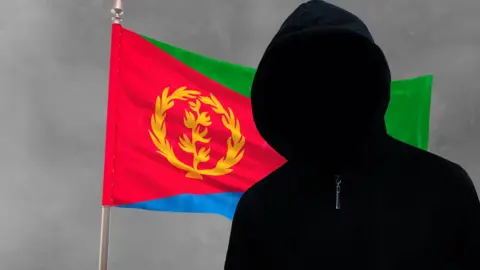 BBC News
BBC NewsHe's the editor of a popular Facebook page that provides news from a country with one of the world's worst records on press freedom. But not even the journalists who write for him know his real identity. READ MORE
You can follow BBC Trending on Twitter @BBCtrending, and find us on Facebook. All our stories are at bbc.com/trending.
